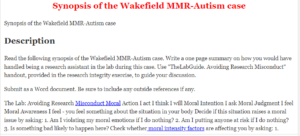Synopsis of the Wakefield MMR-Autism case
Synopsis of the Wakefield MMR-Autism case
Synopsis of the Wakefield MMR-Autism case
Description
Read the following synopsis of the Wakefield MMR-Autism case. Write a one page summary on how you would have handled being a research assistant in the lab during this case. Use “TheLabGuide. Avoiding Research Misconduct” handout, provided in the research integrity exercise, to guide your discussion.
Submit as a Word document. Be sure to include any outside references if any.
The Lab: Avoiding Research Misconduct Moral Action I act I think I will Moral Intention I ask Moral Judgment I feel Moral Awareness I feel – you feel something about the situation in your body Decide if this situation raises a moral issue by asking: 1. Am I violating my moral emotions if I do nothing? 2. Am I putting anyone at risk if I do nothing? 3. Is something bad likely to happen here? Check whether moral intensity factors are affecting you by asking: 1. Would my peers in research see a moral issue here? 2. How close do I feel to the people involved in this situation? I ask – weigh different choices to distinguish right from wrong, better from worse, and between competing tensions 1. If I take action, is that fair or unfair? Morally right or morally wrong? 2. What would someone I respect think is the best option? 3. If I take action, is that decision in line with my lab’s rules and culture? What about my university’s rules and culture? Ask whether moral intensity factors are affecting your judgment: 1. What would my peers in research think about my actions? 2. How much harm could come to someone if I take action? What if I don’t take action? How much harm could come to the lab? What about to the university? 3. How likely is it that this situation will turn out badly if I don’t take action? I think I will – decide what to do or not to do 1. What do I think I should do? 2. How much will what other people think about me influence my decision? 3. Do I intend to act on that decision? I act – carry out your intention, even if there is great opposition 1. Do I follow through on this intention? 2. What may prevent me from acting on my intention?
3. What may help me follow through on my intention? Facilitator’s Guide Page 26 THE WAKEFIELD MMR-AUTISM CASE Synopsis and Rationale for Inclusion: An undisclosed conflict of interest between a principal investigator and the entity funding their research can have far-reaching effects beyond the scope of the research study. In the MMR-autism case, Andrew Wakefield had undisclosed monetary conflicts of interest and was found to have violated human subjects protection rules in research underlying an article published in the Lancet (UK GMC, 2010; Triggle, 2010).1 In the opinion of the British Medical Journal, Wakefield also falsified data (Godlee et al., 2011). A formal retraction did not occur for over a decade, allowing ample time for the purported findings to become an important support for the anti-vaccine movement. This case not only confronts the issue of conflicts of interest but also weaknesses in institutional research governance, coauthor responsibility, and journal responsibility. In 1998, Andrew Wakefield published a paper in The Lancet claiming that he had found a link between the measles, mumps, and rubella (MMR) 3-in-1 vaccine and regressive autism, as well as a bowel disorder, using a sample of 12 children. Within a year, an article with a sample of 498 children rebutted Wakefield’s findings, followed by additional rebuttal articles for several years thereafter (Taylor et al., 1999). However, Wakefield’s article resonated with anti-vaccine movements in several countries, especially in the United Kingdom and United States, prompting some parents to refrain from vaccinating their children for fear of a connection to autism, contributing to decreased vaccination rates in the United States and United Kingdom and compromising the near success of eradicating these diseases from Western countries. Six years after the 1998 article was published, 10 of the 12 coauthors retracted the paper’s interpretation that the results suggested a possible causal link between the MMR vaccine and autism (Murch et al., 2004). In 2010, based on the UK General Medical Council’s (GMC) Fitness to Practice Panel findings, The Lancet retracted the full article (Lancet Editors, 2010). Both of these retractions were prompted by the investigation by a British journalist, Brian Deer, initially published in the Sunday Times in early 2004. Deer exposed that Wakefield had undisclosed financial interest in the research results, reporting that Wakefield had negotiated a contract with a lawyer who hired him to provide evidence against the MMR vaccine to help support a lawsuit against the MMR manufacturing company (Deer, 2011a). Deer reported that Wakefield profited approximately $750,000 USD from the partnership (Deer, 2011a). In addition, Deer stated that Wakefield applied for a patent on his own measles vaccine, from which he was positioned to personally profit (Deer, 2011a). In addition, Deer reported that throughout the study, “Wakefield had repeatedly changed, misreported and misrepresented diagnoses, histories and descriptions of the children, which made it appear that the syndrome had been discovered” (Deer, 2011a). Lastly, Deer reported that the study sample was selectively recruited and not consecutively chosen as Wakefield had reported (Deer, 2011a; Wakefield et al., 1998, retracted). Deer then broadcast his findings on a UK television program, excerpts of which were later broadcast in the United States during an NBC Dateline investigation on Wakefield. In addition to Deer’s findings, the GMC found that Wakefield had performed unnecessary invasive tests on children that were “against their best interests,” was not qualified to perform the tests, did not have the necessary ethics approval to conduct his study, and unethically gathered blood samples by paying children at his son’s birthday party for samples (Triggle, 2010; UK National Academies of Sciences, Engineering, and Medicine; Policy and Global Affairs; Committee on Science, Engineering, Medicine, and Public Policy; Committee on Responsible Science. Fostering Integrity in Research. Washington (DC): National Academies Press (US); 2017 Apr 11. Appendix D, Detailed Case Histories. Available from: https://www.ncbi.nlm.nih.gov/books/NBK475955/ GMC, 2010). He was found guilty of more than 30 charges of serious professional misconduct and removed from the UK’s medical register (Triggle, 2010; UK GMC, 2010). Also in 2004 and soon after Deer’s investigation, The Lancet launched an investigation of the paper. Other than undisclosed parallel funding and ongoing litigation, the Lancet reported that their editors did not find evidence of intentional deception or data falsification and so did not retract the paper (Eggertson, 2010). The article remained in the publication until the GMC’s findings and subsequent actions in 2010, at which point The Lancet editors agreed “several elements of the 1998 paper by Wakefield et al are incorrect, contrary to the findings of an earlier investigation” and fully retracted the paper (Lancet Editors, 2010). The journal’s editor, Richard Horton, said that “he did not have the evidence to [retract the paper] before the end of the GMC investigation” (Boseley, 2010). In 2011, Brian Deer produced additional investigative reporting in support of his allegation that Wakefield falsified data, which was published by the British Medical Journal (Deer, 2011b). Deer’s work was endorsed by the editors of BMJ (Godlee et al., 2011). Wakefield denies ever having committed research misconduct; in a press complaint, Wakefield insisted “he never claimed that the children had regressive autism, nor that they were previously normal . . . never misreported or changed any findings in the study, never patented a measles vaccine . . . and he never received huge payments from the lawyer” (Deer, 2011b). Furthermore, he claims to be a victim of conspiracy via a Centers for Disease Control (CDC) cover-up, alleging the “CDC has known for years about an association between the MMR vaccine and autism” (Ziv, 2015). Wakefield’s recent basis of this claim is a 2014 article by Brian Hooker published in Translational Neurodegeneration in which Hooker reevaluates data collected by the CDC and suggests African American boys who received the MMR vaccine before 24 months and after 36 months of age showed higher risks for autism (Hooker, 2014, retracted). However, the Hooker paper was later retracted because of conflicts of interest and questionable research methods (Translational Neurodegeneration Editor and Publisher, 2014). Following the 2004 investigation, Wakefield moved to the United States, where he is not licensed, but continues to defend the MMR-autism connection. He attempted to sue Deer and the BMJ in 2010 for defamation, but the lawsuit was dismissed (Lindell, 2014). Wakefield works out of Austin, Texas, as an anti-vaccine activist, where he has received support from parents of children with autism (Deer, 2014). He directed the documentary Vaxxed: From Cover-Up to Catastrophe, which was to have been shown at the 2016 Tribeca Film Festival, but was withdrawn (Goodman, 2016). In March 2011, the University College London (UCL), which took over the Royal Free Hospital where Wakefield worked at the time, announced intentions to conduct an institutional investigation on Wakefield (Reich, 2011). However, over 1 year later, UCL had not completed the investigation and explained that “given the passage of time, the fact that the majority of the main figures involved no longer work for UCL, and the fact that UCL lacks any legal powers of compulsion,” an investigation would not be a worthwhile endeavor for the university (UCL, 2012). Instead, UCL published a paper, MMR and the Development of a Research Governance Framework in UCL, detailing revisions made to the university’s research governance framework in response to the shortcomings raised by the Wakefield case National Academies of Sciences, Engineering, and Medicine; Policy and Global Affairs; Committee on Science, Engineering, Medicine, and Public Policy; Committee on Responsible Science. Fostering Integrity in Research. Washington (DC): National Academies Press (US); 2017 Apr 11. Appendix D, Detailed Case Histories. Available from: https://www.ncbi.nlm.nih.gov/books/NBK475955/
Use the following coupon code :
NursesHomework


